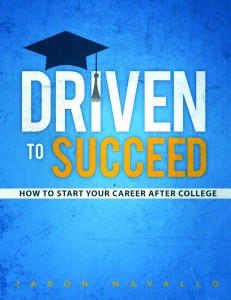Driven to Succeed, written by Jason Navallo, is aimed to help post-graduation students start their careers after college by answering five questions: Which field should I choose? How should I write resumes? Where should I look for jobs? How should I prepare for interviews? How should I start a job search?

Aside from reviewing the basic steps of applying for jobs that most students, hopefully, already know by the time graduation rolls around, D2S also offers hints and tips to maximize the use of tools such as LinkedIn and post-interview thank you notes.
Which field should you choose? Searching for open positions is possible the hardest task to accomplish in a job search. Navallo gives examples of effective search engine queries such as inputting the current year and following with “growing fields” so that you can see which industries may have a large number of opportunities available.
He also suggests looking at postings for senior level positions to gain an understanding of what skills you will need to build for the future. It can help to plan which entry-level position is best suited for you.
How should I write resumes? Use resources available at the campus career center; they can provide format and editing services. Make sure that you are selling yourself and creating a brand and not just stating what you have accomplished. Fill your resume with effective keywords because recruiters and hiring managers will notice you faster and are more likely to keep your resume in their pile if they are looking for specific skills.
Where should I look for jobs? Internships and part-time jobs are great experience building opportunities that shouldn’t be pushed aside after college if you are having trouble landing your dream career. Using job search engines is a great way to find current openings. Use keywords in your search to find jobs with skills relevant to your experience. Be open to relocating; you may have to move out of your comfort zone but companies are more likely to hire you and there may be opportunities in the future to move to a city you would prefer. Network and connect to people in your industry.
Many professionals are willing to offer free career advice, all it takes is a message on LinkedIn.
How should I prepare for interviews? Glassdoor is a website that offers the inside scoop on interview processes with large companies. You can get first-hand knowledge for what your interview experience might be like if you’re applying to one of the companies they have listed.
Be honest about your experiences. Be prepared for longer interview processes that might require a phone interview before meeting face-to-face. Follow up with thank you notes!
How should I start a job search? Create a flexible plan that doesn’t rely on dates and times. Decide on a number of jobs to apply to during the week and weekend. Continuously apply until you’re sure you’ve found the right one. Even if you’ve landed your first job, continue to apply to jobs that will advance your career in the direction you want it to go.
These are all the tips I learned from reading D2S. I found my favorite aspect of his book is that he provides examples of what to say in an interview, how to write specific parts of your resume, and what a thank-you note might look like. It makes the process of job hunting seem less daunting.
Driven to Succeed is worth a read if you’re in your senior year, or even junior year. It’s a short 38 pages of advice that will help you feel more confident as you plan to start a career after college.
The take-away: to be driven to succeed you must find, in yourself, the motivation to keep moving toward your goals and career aspirations. All it takes, according to Navallo, is persistence and tenacity.












